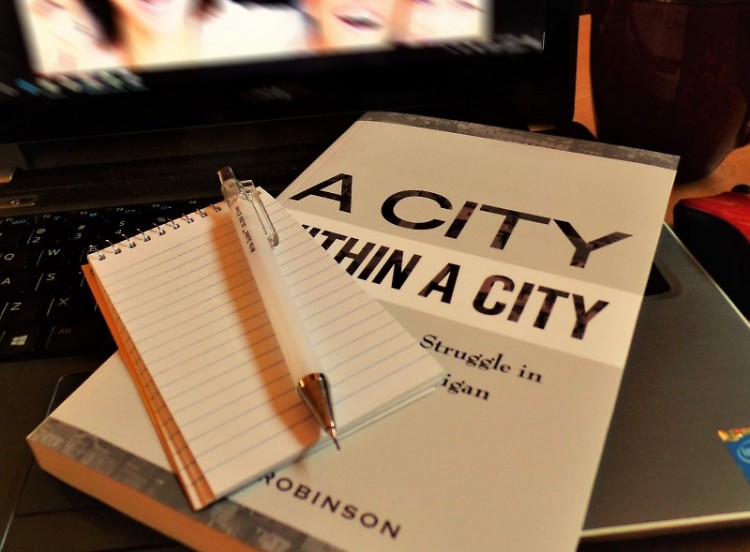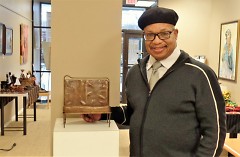Part 3 of 4
During a recent roundtable discussion with local small business owners, hosted by MiBiz, some on the all-white panel brought up the large economic gap between people of color and whites in Grand Rapids. As I researched the issue, one theme that came up consistently was lack of mentorship. Though nobody may intend to leave people out, the lack of coaching can have lasting consequences.
From the roundtable
MiBiz, "What can West Michigan business owners do to address ... racial and economic disparities?"
Scott Hill of Varnum, "One thing we’re doing with our diversity and inclusion council is thinking about it from a lateral hiring standpoint. We've ...[done] well at law schools and with entry-level hiring. Then they come to the firm and say there’s nobody that looks like me here. Where are my mentors in the community? ... When we think about the entrepreneurial opportunities here and ... a young person wants to come here and start their business, well, where are the mentors?"
‘The reason I left’
Cherilyn DeVries, a former journalist for the Advance who lived in Grand Rapids from 1988 to 1995, agreed that mentoring was a particular problem. She said the article reminded her of her time here. She also appreciated that this topic was addressed by some of the participants. “Shining a light on the disparity is very important as you consider the role that business owners have in politics today."
"Many of these men are handed loans, given mentorships and admired quite automatically. They’re smart and diligent, but many of them end up thinking they built their businesses all themselves because they are blind to the advantages they've been given.”
DeVries, who is white, said that when she attended Calvin College she noticed that “guys got mentored toward fellowships and women got glorified secretarial positions. Dutch businessmen took white grads under their wing while qualified Black men and women were kind of expected to head for the lower-paying non-profit sector to help ‘their people.’” DeVries said that after being a reporter and seeing the disparity in Grand Rapids, “I just couldn't handle it anymore. One of the reasons I left was because of the segregation and racism, which was woven into the religious systems of predestination.”
“Being ‘chosen people’ was translating in real life to a racist power structure,” DeVries said. “White Dutch people with power automatically bestowed favors and goodwill on people who were like them."
This is also called “affinity bias,” according to an Institutional Bias workshop given by Partners for a Racism-Free Community. Leaders and teachers tend to draw in subordinates and students who remind them of themselves, easing their way through the system. It’s part of human nature, but DeVries has a point that confusion around common Calvinist doctrine can amplify this tendency.
Sometimes support system is 'thin'
Adriane Johnson owns the newly formed Rebellious Creatives, which does affordable web design for start-ups. She is also the founder of Scope Me, a photography contest run by online voting. She agrees that coaching can play a big role. "Some people who are thriving in their businesses are willing to help others succeed in a mentorship kind of way. Others may say the same thing, but pick and choose who they see fit to have a successful business."
"It's much like a Start Garden effect when it comes to new players in the field -- who will make it into the elite of successful business owners. Sometimes the support system is thin between those who are succeeding and those who are just starting out."
Johnson herself has received mentoring through Hook A Sista Up, now Sisters Collaborative (website under development), run by her biological sister, Linda Otterbridge. With the coaching of entrepreneur Tami VandenBerg (The Meanwhile Bar, Pyramid Scheme), Johnson said she was able to perform a successful trial run of an arts bar by placing it in an already established location (Rezervoir Lounge). But so far the better-known mentoring networks haven't shown interest in her projects. Johnson was quite comfortable with VandenBerg, but when it came to bigger names with money, she feared sharing the full scope of her ideas with people who could easily fund them as their own.
Mentorship
This kind of mistrust can be common when the mentor is quite established within the power structure. Though well-meaning, a white mentor may not understand the culture and barriers that women of color or other marginalized folks navigate. In the past, mentoring has often been used as a remedial function to try to bring up women and people of color, rather than a sharing of information between two equals with different experiences.
Catalyst Research has published a guide to optimizing mentoring strategies for women of color. Ideas include:
- Find diversity champions to serve as mentors: This might be someone who would naturally interrupt jokes that stereotype on the work site.
- Offer positive recognition for mentors and mentees: They both have things to offer.
- Allow time for trust to develop: This may mean mentoring for 2-3 years rather than one.
- Encourage multiple mentors: Research shows that women of color do better with two or more mentors filling different functions.
Affinity bias has serious consequences
The patterns that DeVries saw in the 1990s have long-lasting consequences. Many of the students she attended college with are now at the height of their careers and mentoring others, often through informal means that depend on attending the same church or social gatherings. In our segregated city full of busy lives, it may not occur to many whites to inquire after talented entrepreneurs of color for the insights they have to offer.
For whites, this can seem a small and harmless oversight. We can't see that we're missing a chance to develop more social connections and to improve the local economy.
For women and people of color, this oversight is part of a system in which they have fewer opportunities to network, be hired, get a business loan, develop income, and create wealth. This in turn affects the health care they can access, the quality of neighborhoods they live in, the level of policing they experience, the infant mortality rate, and several other factors that affect quality of life, longevity, and safety. Because of the extreme disparity, affinity bias and other systemic biases are life changing and even life threatening.
Sisters Collaborative isn't the only local network for mentoring women in Grand Rapids. The Latina Network of West Michigan also creates a relaxed space where Latinas can learn how to network and advocate for themselves professionally. And the Midwest Tech Project mentors youth of color toward the developing tech industry. To achieve greater equity and dismantle bias, both historically marginalized people and those with privilege can offer meaningful mentoring. This may be a key leverage point in addressing disparity in Grand Rapids.
The rest of the series:
Part 1 explores journalism's role in perpetuating systemic bias.
Part 2: explores measurable longterm strategies for equity.
Part 4: entrepreneur Adriane Johnson speaks out
The Rapidian, a program of the 501(c)3 nonprofit Community Media Center, relies on the community’s support to help cover the cost of training reporters and publishing content.
We need your help.
If each of our readers and content creators who values this community platform help support its creation and maintenance, The Rapidian can continue to educate and facilitate a conversation around issues for years to come.
Please support The Rapidian and make a contribution today.


